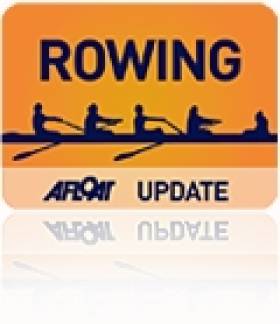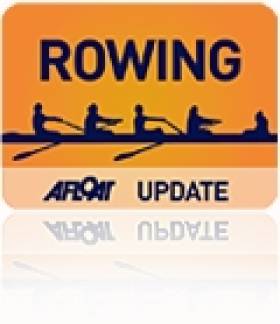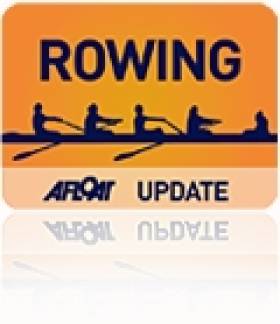Displaying items by tag: Nixon,
Dukarska Comes Out on Top in Battle With Nixon
#ROWING: Monika Dukarska and Holly Nixon engaged in an entertaining battle in the women’s single sculls at Queen’s University Regatta at Castlewellan today, with Dukarska coming out on top in the closing stages. Helen Walshe, who won the first round of the eFlow Go Row League, was third, and Sinead Jennings fourth. Colin Williamson won the men’s equivalent. Queen’s won the Division One men’s eight. Galway Rowing Club finished second, beating Bann and Methodist College in the battle of the junior eights. Skibbereen won the women’s eight.
Queen’s University Regatta, Castlewellan – Selected Results
First Session
Men
Eight - Division Two – A Final: 1 Queen’s (novice) 5:37.23, 2 Neptune (jun) 5:40.85, 3 Methody (jun) 5:50.92. B Final: Neptune (jun 16) 5:59.44.
Four, coxed – Division One – A Final: Queen’s (sen) 5:43.38, 2 Bann (inter) 5:47.25, 3 Methody (jun) 5:51.66.
Pair – Division One – A Final: 1 Bann (J Cassells, C Black; jun) 5:59.41, 2 Portora (jun) 6:06.41, 3 Queen’s (sen) 6:08.41. B Final: Queen’s (sen) 6:32.56; 3 Commercial 6:44.56.
Sculling, Single – Division One – A Final: 1 Queen’s (C Williamson, sen) 6:12.03, 2 UCD (D Neale) 6:16.04, 3 Skibbereen (A Burns; jun) 6:17.79, 4 Neptune (Bailey, inter) 6:20.14. B Final: 1 Queen’s (McKibbin, sen) 6:26.59; 3 RBAI (Beck, lightweight) 6:30.32. C Final: Shandon (Casey; jun) 6:27.95.
Division Two – A Final: 1 Lee (Twomey-Thompson, jun) 7:20.75, 2 RBAI (McKillan; jun) 7:24.25, 3 Skibbereen (Keating; jun 16) 7:26.80. B Final: (O’Sullivan; jun 16) 6:26.59. C Final: Offaly (Gannon; nov) 7:32.09.
Women – Eight – Division One – A Final (aggregated result from two races): 1 Skibbereen (sen) 5:47.87, 2 Galway (jun) 5:56.36, 3 St Michael’s (jun) 5:58.87.
Four, coxed – Division One – A Final: 1 Commercial (inter), 2 Queen’s, 3 Belfast. Division Two, coxed – Final: 1 Queen’s (nov) 6:53.80, 2 Belfast BC (nov) 7:02.08, 3 Commercial (nov) 7:23.12.
Sculling, Quadruple – Division One A Final: 1 Three Castles (sen) 5:59.66, 2 Portora/Belfast/Fermoy/Skibbereen (sen) 6:06.91, 3 Shandon (jun) 6:18.40. B Final: Skibbereen (jun) 6:17.49. Division Two, coxed – A Final: 1 Galway (jun 16) 6:43.76, 2 Killorglin (jun 16) 6:48.17, 3 St Michael’s (jun 16) 7:01.14. B Final: Athlunkard (nov) 7:09.56.
Double – Division One – A Final: 1 Skibbereen (D Walsh, M Dineen; sen) 6:47.80, 2 Skibbereen (sen) 6:55.87, 3 Three Castles (sen) 6:56.24; 4 Neptune (jun) 7:11.52. B Final: 1 Carrick-on-Shannon (jun) 7:33.88, 2 Garda (inter) 7:39.54.
Division Two – A Final: 1 Muckross (jun 16) 7:18.96, 2 S Michael’s (jun 16) 7:27.63, 3 Commercial (jun 18) 7:35.06; 5 Queen’s (nov) 7:44.70. B Final: Lee (jun 18) 7:29.14.
(Second session; run on Time Trial Basis)
Men
Eight – Division One: 1 Queen’s (senior) 4:40.74, 2 Galway (junior) 4:45.74, 3 Bann (jun) 4:48.25; 4 Methodist College, Belfast (jun) 4:50.19, 5 Queen’s (intermediate) 5:08.80, 6 Queen’s B (inter) 5:12.65.
Fours – Division One: 1 Bann/Portora (sen) 5:04.80, 2 Queen’s 5:14.46, 3 Methody 5:38.27. Fours, coxed – Division Two: 1 Queen’s (nov) 5:38.95, 2 UCD (nov) 5:55.15, 3 UCD (nov) 6:00.05; 5 Methody (jun) 6:06.41; 6 Commercial (jun 16) 6:14.22.
Sculling, Quadruple – Division One: 1 Queen’s (sen) 5:07.78, 2 Skibbereen (jun) 5:16.68, 3 Bann (inter) 5:19.25. Division Two (coxed): 1 Neptune (jun 16) 5:44.06, 2 Galway (jun 16) 5:48.71, 3 Commercial (jun) 6:00.09; 5 Athlunkard 6:04.40. Double – Division One: 1 Queen’s (sen) 5:32.40, 2 Shandon (jun) 5:39.50, 3 Skibbereen (jun) 5:40.65; 5 Garda 5:41.46. Division Two 1 Lee (jun 16) 5:55.38, 2 Lee B (jun 18) 5:59.18, 3 Skibbereen (jun 16) 6:07.36; 6 Galway (nov) 6:15.90.
Women
Eight – Division Two: 1 Queen’s (nov) 5:59.63, 2 Athlunkard (nov) 6:21.24, 3 Shannon (nov) 6:29.83; 4 Methody (jun 16) 6:39.25; 6 Shannon 7:03.44.
Four – Division One: 1 Queen’s (sen) 5:58.49, 2 Skibbereen (sen) 6:06.54, 3 Bann/St Michael’s (sen) 6:12.98; 4 Muckross (jun) 6:14.03.
Sculling,
Single – Division One: 1 Killorglin (M Dukarska; sen) 6:24.17, 2 Portora (H Nixon; sen) 6:24.88, 3 Three Castles (H Walshe; sen) 6:36.41; 4 St Michael’s (Jennings; sen) 6:44.42, 5 Three Castles (B Quinn; lwt) 6:49.76, 6 Fermoy (H Shinnick; jun) 7:03.23; 11 Queen’s (Addley; inter) 7:20.54. Division Two: 1 Queen’s (Richards; nov) 7:55.56, 2 Methody (English; jun 16) 8:01.29, 3 St Michael’s (Sherin, jun) 8:06.93.
# ROWING: The eFlow Go Row League moves on to the beautiful setting of Castlewellan Lake in Co Down this Saturday for the Queen’s University regatta.
The battle to be the top women’s single sculler will be a highlight. Helen Walshe of the Three Castles club in Wicklow won the Division One title in the first round of the eFlow League in Skibbereen, but she must overcome some world-class talent if she is to continue her run. Holly Nixon, the silver medallist at last season’s World Junior Championships, and former senior world champion Sinead Jennings (sister of Olympic marathon hopeful Catriona) are both entered in a top-class field of 29 rowers.
The men’s Division One single sculls should be hugely competitive. Colin Williamson and Rory O’Connor of the host club, Queen’s, take on the country’s best junior athlete in Paul O’Donovan of Skibbereen, and outstanding UCD oarsman Dave Neale. Beijing Olympian Cathal Moynihan is also among the entry of 37 competing for the Division One title.
Queen’s will be hot tips to take the Division One men’s eights’ title on the day. They have three crews of the six entered, and their main rivals at Skibbereen regatta, Grainne Mhaol, have decided not to travel. The hosts also have a great chance in the women’s Division One eights, although Skibbereen will have their own hopes of topping off their long journey with a win. First-round victors UCD are take a break for this round.
One of the big advantages of the eFlow Go Row League format is that it pits ambitious juniors against proven seniors. In the Division One men’s pairs, Coleraine men Chris Black and Joel Cassells, whose target this year is a medal for Ireland at the World Junior Championships, will be out to win the Division One title at Castlewellan. Among their opponents is the St Michael’s crew of Kevin O’Connor and Sam Lynch. Lynch is a former double World Champion.
Skibbereen topped the rankings after the first round of the eFlow Go Row League. The next two rounds are hosted by Dublin Metropolitan regatta (May 26th) and Cork regatta (June 23rd).
Top Junior Rowers Nixon and Cromie Win US Scholarships
ROWING: The prizegiving at the National Assessment Regatta at the NRC in Cork contained an announcement by Martin McElroy of the High Performance Programme that two Irish teenagers have landed full scholarships at American universities. Holly Nixon, a silver medallist at last year’s World Junior Championships, will be going to the University of Virginia, while Katie Cromie has been granted a scholarship to the University of Michigan. Nixon has now moved up from junior.
Rowing Ireland Prize-Giving
Men
Under-23 Pair: Sean O’Connor, Eddie Mullarkey. Junior: Joel Cassells, Chris Black
Single Scull – Senior: Justin Ryan. Junior: Paul O’Donovan
Women
Pair – Junior: Hanna McCarthy, Hanna O’Sullivan
Single Scull – Senior: Sanita Puspure. Junior: Bridget Jacques
Irish Assessments, National Rowing Centre, Cork – Day Two
Selected Results (includes projected per centage of gold-medal winning time in athletes’ class)
Men
Pair – A Final: 1 S O’Connor/E Mullarkey (under-23) 7:25.6 (85.6), 2 J Cassells/C Black (junior) 7:27.1 (87.4), 3 H Millar/L Seaman (junior) 7:34.0 (86.0). B Final: K Keohane/N Crowley (jun) 7:43.0 (84.4). C Final: D McCarthy/M Kelly (jun) 8:00.8 (81.2).
Single Sculls – A Final: 1 J Ryan (under-23 lightweight) 7:57.4 (85.9), 2 M Maher (lightweight) 7:58.7 (83.6), 3 A English (lightweight) 7:59.2 (83.5), 4 P O’Donovan (junior) 8:04.0 (85.1), 5 Jonathan Mitchell (under-23 lightweight) 8:15.0 (82.8), 6 D Quinlan (jun) 8:32.4 (80.3). B Final: 1 S O’Driscoll (under-23 lightweight) 7:56.2 (86.1), 2 A Griffin (jun) 7:56.4 (86.4), 3 M Ryan (jun) 8:03.1 (85.2). C Final: A Burns (jun) 7:53.1 (87.0). D Final: F Manning (sen) 7:58.7 (83.1). E Final: G McKillen (jun) 8:16.3 (82.9).
Women
Pair – A Final (all juniors): 1 H McCarthy/H O’Sullivan 8:28.5 (84.7), 2 B Edgar/E Hutchinson 8:29.0 (84.6), 3 A Cooper/K O’Connor 8:31.8 (84.1).
Single Scull – A Final: 1 S Puspure (heavyweight) 8:25.6 (84.1), 2 B Jacques (jun) 8:37.7 (86.1), 3 M Dukarska (under-23 heavyweight) 8:38.1 (84.0), 4 S Dolan (under-23 lightweight) 8:50.3 (85.1), 5 H Shinnick (jun) 8:53.6 (83.6), 6 K Cromie (jun) 8:59.1 (82.7). B Final: K O’Brien (jun) 8:42.7 (85.3). C Final: F Murtagh (jun) 8:38.1 (86.1). D Final: M McLaughlin 8:56.5 (83.1).
































































